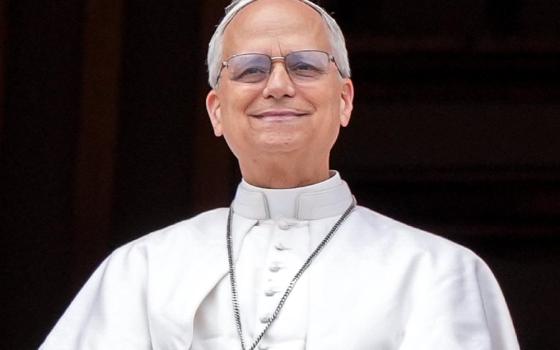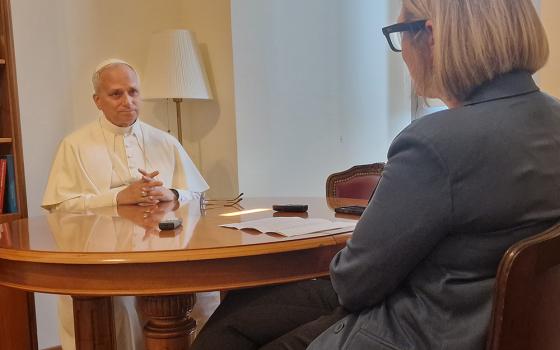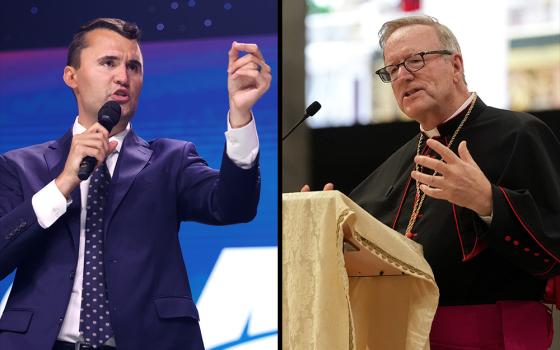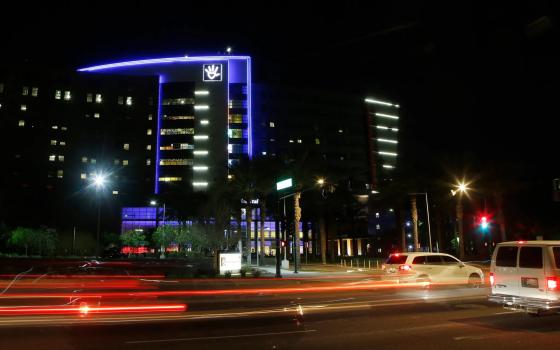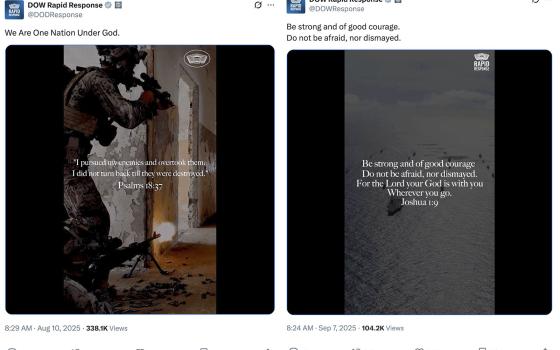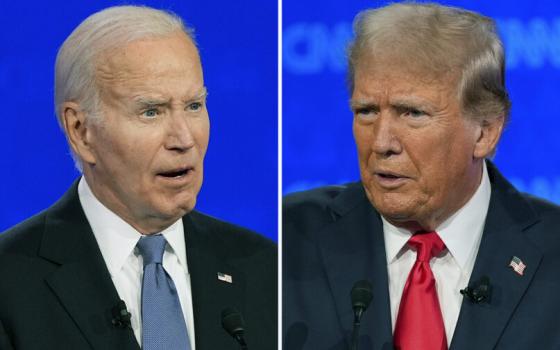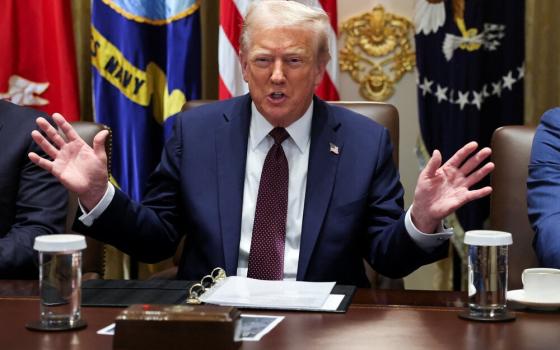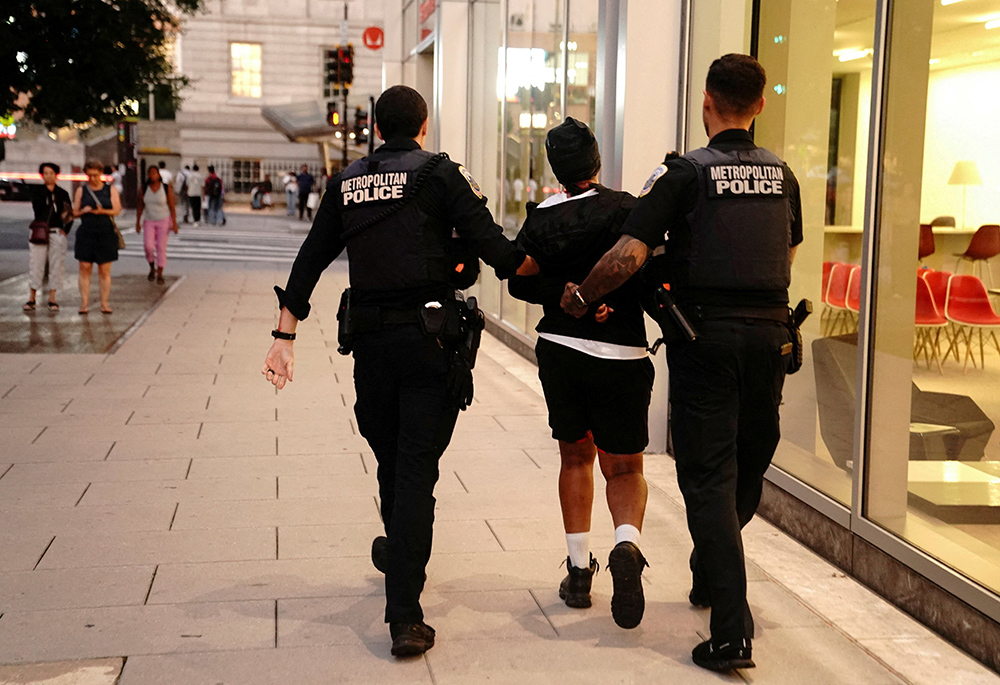
Members of the D.C. Metropolitan Police detain a person after an altercation between members of the public in Washington Aug. 14, 2025, following President Donald Trump's announcement of the federal takeover of the Metropolitan Police Department under the Home Rule Act and the deployment of the National Guard to assist in crime prevention in the nation's capital. (OSV News/Reuters/Nathan Howard)
For the first time since residents of Washington won the right to elect their own representatives in 1973, also known as home rule, a president has attempted to federally take over the District of Columbia police, the Metropolitan Police Department, or MPD.
As a Washington, D.C., law professor with a focus on victims' rights and a former assistant U.S. attorney in Washington, I have seen over many decades the complexities of crime both in the District of Columbia and across the country.
In a free society, a criminal justice policy is not only brute force, but respects the inherent dignity of all. The mission of the Department of Justice reflects this challenging balance to "uphold the rule of law, to keep our country safe, and to protect civil rights."
Pope Francis mirrored the appreciation of this balance. In discussing organized crime, the late pontiff noted people deserve freedom from "the fear of violence, oppression or injustice." In a separate statement, he prayed for "a more widespread culture of nonviolence, that will progress when countries and citizens alike resort less and less to the use of arms."
In response to this attempted takeover, many sounded the alarm, alleging that this, combined with activating the National Guard and ordering a surge of federal law enforcement, is actually an attempt to impose military control on Washington. It is a notable contrast to the president's response when over 1,000 people invaded the Capitol building on Jan. 6, 2021.
The president claims that this tactic is legal and a necessary response to an "emergency." In normal circumstances, government policy regarding crime reflects a tension between crime control measures and liberty. At this historical moment with the administration's history of violating court orders, stretching the limits of legal guardrails, or refusing to enforce a law passed by Congress, valid questions emerge regarding both the legality and propriety of this unprecedented action.
It is critical to wade through all the noise and hyperbole and assess this act based on the law, the claimed justification, its execution and context to determine whether those alarms have merit.
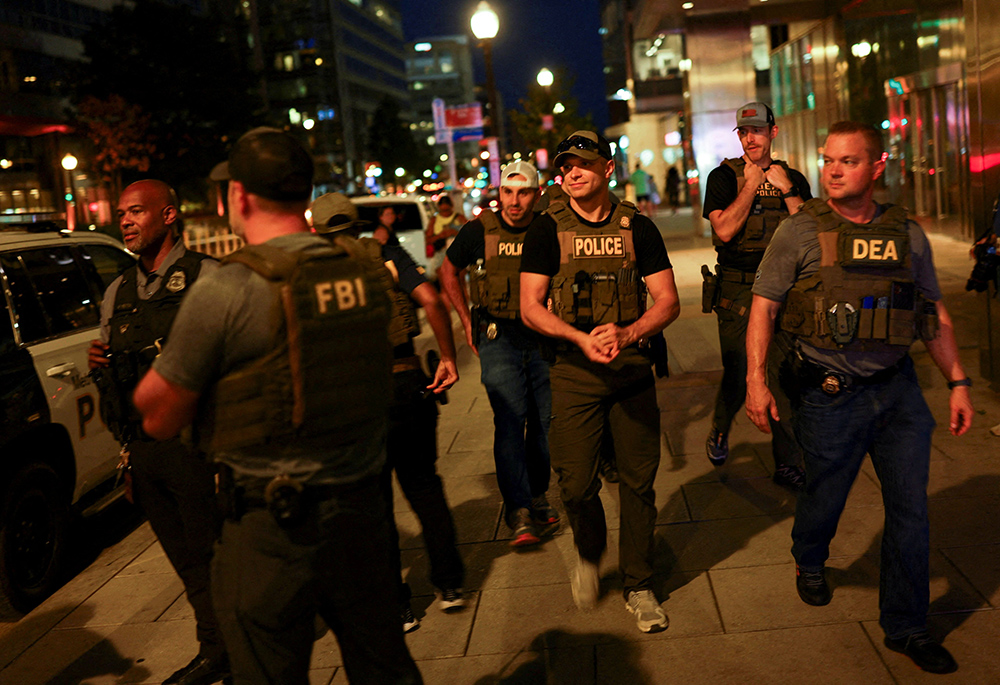
Members of the Drug Enforcement Administration and police patrol near Navy Yard in Washington Aug. 14, 2025, after President Donald Trump's announcement of the federal takeover of the Metropolitan Police Department under the Home Rule Act and the deployment of the National Guard to assist in crime prevention in the nation's capital. (OSV News/Reuters/Jose Luis Gonzalez)
What the law says
First, the law. Washington, D.C., occupies a unique position as a city of approximately 700,000 people but also the seat of the federal government and subject to congressional legislative power. Since 1973 and the passage of the Home Rule Act, Congress (supported by then-President Richard Nixon) afforded the District self-governing powers placing local government functions under local control.
Recognizing that threats to the federal government could occur in Washington, Section 740 of the Home Rule Act allows the president to:
- Identify and determine that the "special conditions of an emergency nature exist" that require the use of MPD "for federal purposes";
- Direct the mayor to provide services in support of that federal emergency for no longer than 30 days.
Serious questions remain about the claimed scope of these powers and whether an emergency exists. President Donald Trump and Attorney General Pam Bondi seem to not understand that the power is limited to directing the mayor to provide assistance to respond to a federal emergency, instead characterizing their power as allowing essentially a takeover of the police.
On its face these claims exceed the powers outlined in the Act's plain text. Such was the conclusion of the D.C. attorney general who sued and U.S. District Judge Ana Reyes who threatened to grant their injunction if Bondi did not rescind and modify her order, which she did. The president's order remains.
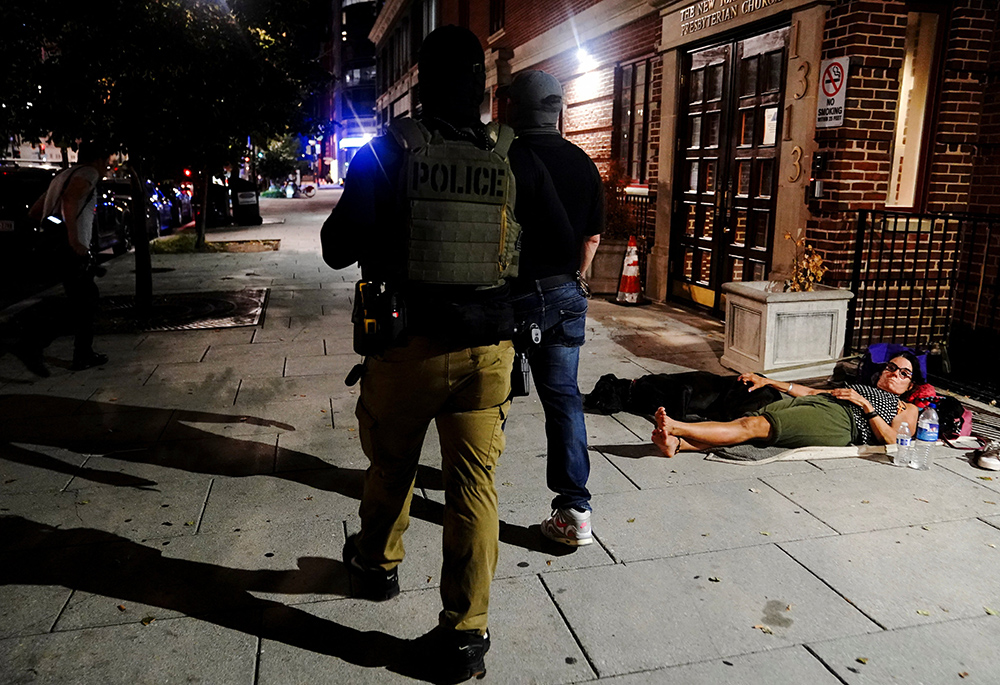
Members of federal law enforcement walk past a homeless woman outside of a church in Washington Aug. 14, 2025, following President Donald Trump's announcement of the federal takeover of the Metropolitan Police Department under the Home Rule Act and the deployment of the National Guard in the nation's capital. (OSV News/Reuters/Nathan Howard)
Second, the justification. The Home Rule Act requires an "emergency" and "federal purposes." Trump's order does not indicate a basis for this emergency. Crime certainly exists in Washington, D.C., and no level of crime should ever be considered acceptable to any city or neighborhood. But for this order to be lawful and appropriate there must be a "crime emergency." The facts do not support one.
The order's claims of "rising violence," and an "increase in violent crime," are demonstrably false. The Department of Justice reported in January of this year that D.C. total violent crime in 2024 decreased 35% since 2023 to its lowest level in 30 years, and that addition to the overall violent crime reduction:
- Homicides are down 32%;
- Robberies are down 39%;
- Armed carjackings are down 53%;
- Assaults with a dangerous weapon are down 27% (compared with 2023);
- The District reported the fewest assaults with dangerous weapons and burglaries in more than 30 years.
According to the MPD, violent crime decreased another 27% between 2024 and this point in 2025.
Advertisement
How Trump's takeover falls short
Not only does the claimed takeover lack factual or legal justification, it fails to advance even the executive order’s stated goals. The order states that it needs the Metropolitan Police Department to assist the president in combatting crime, but then it states it wants to use MPD to protect federal buildings and national monuments. In Washington the neighborhoods with the most crime are located primarily in Ward 8, across the Anacostia River, far from the monuments. Some residents of these neighborhoods would welcome an increased law enforcement presence, even if some are skeptical, and, indeed the mayor indicated she would "make the most of the additional officer support that we have." Media accounts indicate that there is an increased federal presence near the lower crime monuments and nightlife areas.
We know what works: federal and state partnerships where the federal forces take advantage of the intelligence from D.C. frontline workers and collaborate for lasting solutions. Just this April, the interim U.S. Attorney for the District of Columbia celebrated the decrease in D.C. crime, attributing it to the partnership between the U.S. Attorney's Office, the Bureau of Alcohol, Tobacco, Firearms and Explosives, and the MPD. Unfortunately, rather than investing in these successful partnerships, this administration cut more than $70 million from the very programs that aim to curtail violent crime. Then it claims it needs the military to respond to violence.
The U.S. Conference of Catholic Bishops has acknowledged the right of crime victims to be free from violence and that a "fundamental moral measure of the criminal justice system is how it responds to those harmed by crime." And Pope Francis said that democracy has within it "a great and unquestionable value" of working in partnership. "The democratic way is to discuss [problems] together and know that only together can such problems find a solution," he said.
However, this executive order's incorrect expansion of the law, false justification, and faulty execution suggest the order is not intended to either decrease violence or advance democracy. Rather than combat lawlessness, the order risks stoking fears that Trump is advancing lawless authoritarianism by engaging in a power grab normalizing a police state.

